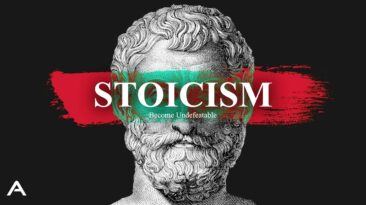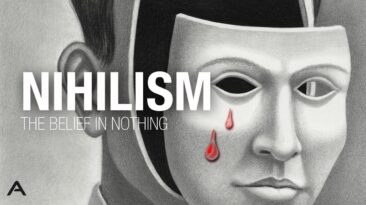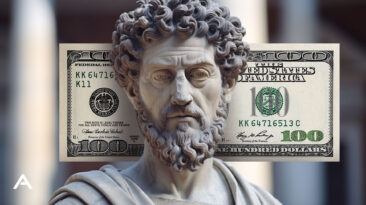We’re all pretty used to rain. We’re either prepared for it with an umbrella or raincoat or just get wet. Rarely does it genuinely upset us.
But what about when it rains for days, and the streets flood, so you can’t go outside? Or when you realize you can’t afford the interest rate on that home you want to purchase?
How do you react when your investments plummet in value? Or you’re laid off without severance?
These are genuine modern problems that plague us at every turn. Problems that haunt our nights with nightmares and fill our days with despair.
But it doesn’t have to be this way. We can learn to remain grounded despite all the problems plaguing our society today.
This is how to become stoic in the modern world.
Stoicism is an ancient Greek philosophy that aims to take us from being vulnerable to the chaotic nature of the Universe to being calm and indifferent to it. It’s a way to fortify yourself for lasting peace of mind.
But as with every practice that involves changing your attitude or disposition, work is involved and, often, sacrifice.
The stoic’s work is to recognize what’s in our control and what isn’t. And the only thing in our control is our reaction to what happens, not the event itself. Obviously, we can influence what happens, but nothing is entirely in our control. Misfortunes are unpredictable and often inevitable.
The stoic philosopher, Zeno of Citium (ceeteeum), used an analogy of a dog being tied by a cart to clarify the stoic position.
“When a dog is tied to a cart, if it wants to follow, it is pulled and follows, making its spontaneous act coincide with necessity. But if the dog does not follow, it will be compelled. So it is with men too: even if they don’t want to, they will be compelled to follow what is destined.”
The cart represents everything beyond our control, all the various happenings of the Universe. A leash attaches us to the Universe; our options are to run with it or to resist and be dragged. To become stoic is to run with the cart.
Imagine you’re at work, and you’re supervisor informs you that the espresso machine you rely on is being removed. Your free daily coffee is suddenly gone. For most of us, this would be devastating. Your reaction here is what’s up to you. You have no control over whether the machine is there or not. You can either run with the cart by accepting that the change is beyond your control or wallow in the misery of no more free coffee. You can be dragged.
The ultimate goal is to improve your inner self, as relying on external things for happiness leaves you at the mercy of a turbulent universe. A universe that is outside of your control.
Stoic philosophers subscribe to a semi-deterministic worldview or compatibilism. Everything that happens has a cause, but sometimes we can’t control that cause—only the action we take. For example, we can choose not to give in to an impulse to eat cake. But the existence of that impulse is beyond our control.
That’s not to suggest we shouldn’t try to improve our external circumstances, but that we can’t rely on desirable outcomes. If we want the result of fixing our car, we still have to pick up the phone to book an appointment. It’s not going to fix itself. Still, we can measure how much effort we’re putting in because that’s what’s in our control. If the mechanic happens to be a charlatan who runs off with your car, you shouldn’t blame yourself. It was beyond your control.
Discussing the ancient philosophy of stoicism is one thing, but what about tangibly implementing it into our modern lives? After all, at the time of its conception, stoicism was for everyone, from slaves to the emperor of Rome. So why not today?
Most of us get caught up in material things, and we expect them to bring us joy. We tell ourselves that the next purchase is what will finally make us happy. A new car, the latest smartphone, that expensive watch.
When we’re unable to get these things because we can’t afford them, we feel bad, like the Universe is opposed to us being happy and that there’s nothing we can do about it.
But the truth is that material things only bring temporary happiness. Your car will break down, and your phone will eventually freeze up. And even when our possessions still work perfectly, hedonic adaptation steps in, and we start to want something newer and shinier. It’s a never-ending cycle.
To escape the trap of consumerism, we need to adopt a different attitude toward our purchases and the dopamine hit we get from them.
To do this, you can practice what the stoics call voluntary discomfort. This is when you subject yourself to discomfort in something you typically enjoy. The most common way people do this is by taking a cold shower instead of a warm one. But you could also hold onto your current phone until it’s no longer usable. Suffer through the cracks and lags and let each new phone launch pass you by.
If that’s too much, start small. Next time you go to the bathroom, leave your phone on your nightstand or desk. Sit with your thoughts on the toilet instead of trying to amuse or torture yourself by doom-scrolling.
Driving somewhere on a hot day? Roll up the windows and drive with the AC off. Or better yet, walk.
Marcus Aurelius, Emperor of Rome, was a practitioner of stoic philosophy. He ruled the empire from 161 CE until his death in 180 CE and was widely considered a great philosopher king, although that may be a historical exaggeration.
As a leader, he wrote down his stoic-influenced meditations, likely as a way of assuring himself while handling significant responsibilities. They were intended for his own use and not meant to be published widely, but fortunately, we have access to them today.
The collection is called Meditations, also called ‘The Inner Citadel.’ In it, you can see how Marcus Aurelius applied his learned stoicism to his daily life as emperor. Here are some quotes that’ll help you get into the stoic mindset.
“Thus we should employ the mind, in all parts of life: when things occur, which, at first, seem worthy of high estimation: we should strip them naked, and view their meanness, and cast aside these pompous descriptions of them, by which they seem so glorious.”
Marcus Aurelius would routinely reflect on the nature of his food as devoid of the pleasures and sensations he instinctively derived from it. A fish is just flesh necessary to sustain you. Ignore the pleasing tastes and satisfaction of filling up.
When you bring your favorite lunch to work, break it into its most basic components. The salad is just leaves and the fruit of a plant. Croutons are wheat smashed into flour and combined with yeast to make bread. The bread is then cut into pieces and dried in an oven.
By doing this, when you’re stuck with a lunch you don’t love or the waiter gets your order wrong, you won’t be as burdened by the thought of eating it or feeling the absence of something more delicious. Lunch is just raw materials to give you energy.
Marcus Aurelius wrote a great deal about how we interact and interpret others. He adopted the metaphysics of stoicism as a way of thinking about our interactions and emotions. For stoic philosophers, the Universe is made from an intelligent design. Humans, too, are part of that same intelligence. It doesn’t make sense to hate the same intelligence in another because it is the same intelligence in you. It’s similar to the Hindu concept of Brahman, the deity that permeates everything.
“I cannot be angry at my kinsmen or hate them. We were naturally formed for mutual assistance, as the two feet, the hands, the eyelids, and the upper and lower rows of teeth. Opposition to each other is contrary to nature: All anger and aversion is an opposition.”
We may think of ourselves as in competition with others. We compete for better grades at school and put down others to get a leadership role at a company. But that’s a surefire way to live a life of envy and malice.
If you see everyone as part of the same intelligence, trying to put others below you would be foolish. You are the same, and treating others as lesser is contrary to nature.
“Seldom are any found unhappy for not observing the motions and intentions in the souls of others. But such as observe not well the motions of their own souls, or their affections, must necessarily be unhappy.”
This reminds us to focus on what is in our control: our attitude. Trying to analyze others will often lead to misery. We spend too long considering why people behave the way they do. In a state of resentment, we question their motives and success.
Most of us know someone who can’t stop complaining or gossiping about others at their job. They’re obsessed with what their coworkers have and never seem particularly happy. Their time would be better spent addressing their own mind, as the minds of others are outside of our control.
“Let us, as I said, be on our guard without suspicion or enmity.”
Aurelius is cautioning himself to be prepared for any attack or betrayal while at the same time not presuming that others have bad intentions. Again, we shouldn’t dwell too much on the intentions of others, but we shouldn’t blindly assume that no one will mean harm.
As any experienced student knows, when working with peers on a group project, be prepared for someone not to pull their weight. At the same time, though, you should never assume and judge that someone won’t. You can needlessly cause dysfunction in the group while allowing others to occupy too much of your mind.
But seriously, if you’re working with three others, one or more of them statistically won’t do their fair share. Be prepared for it but without suspicion or hostility.
“When you are angry at the mistakes and wrong actions of men: for, all are carried toward what appears to them their proper good. But, say you, it is not their proper good. Well: instruct them, then, and teach them better, and don’t be angry with them.”
We can disagree with others, knowing with near certainty that we’re right. But getting angry with them invites more pain and is an ineffective mode of persuasion. They have what they think is the right way in mind, so we shouldn’t think poorly of them. We should try to educate them rather than show our frustration.
This quote from Aurelius speaks to our ongoing culture war. Both sides have an idea of what’s right and allow themselves to get angry and insult the other party. This isn’t to suggest that both sides are correct, but that, especially on social media nowadays, genuine attempts at persuasion have taken a back seat.
There are plenty of attempts to educate in the culture war, but they often come dripping with condescension and likely serve a purpose other than genuine persuasion. They seem more about scoring likes, shares, and validation from existing believers than extending an olive branch.
If we treated others like parts of an intelligent design, we wouldn’t feel the need to mock them. We’d try to help them see the right way forward.
With these mental tools, stoicism can guide you through the pain of life so that you face it with a temperament people would describe as… stoic.
Regardless of what the Universe has in store, your goal is to remain emotionally indifferent. You’ve reinforced your inner citadel and are prepared for both good and bad fortune.
Now, stoicism isn’t a philosophy to take ourselves off the hook for the problems we can influence. But it does acknowledge that so much is beyond our individual control. We can only judge ourselves based on our effort.
If we consider the world’s biggest problems, the solutions are far out of reach for the average person. We can only do our part, make moves where we can, and judge our efforts. We can only change what is in our control.
If you’re wondering why bother with any of this when the Universe itself doesn’t make sense, click the video on your screen right now to understand the philosophy of Absurdism: Life is meaningless.



























